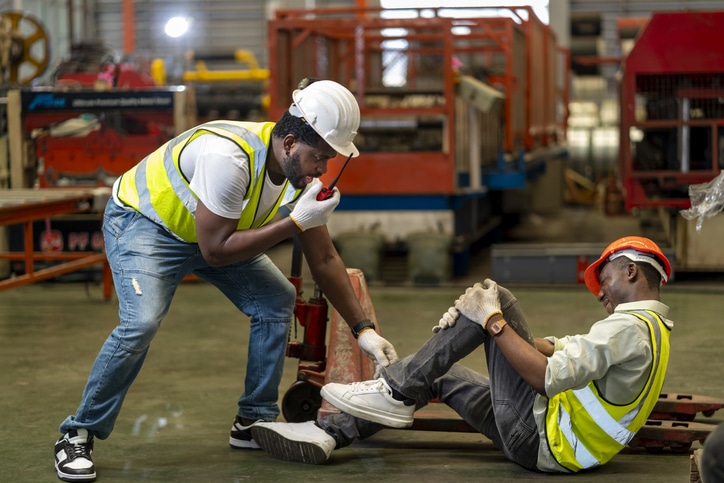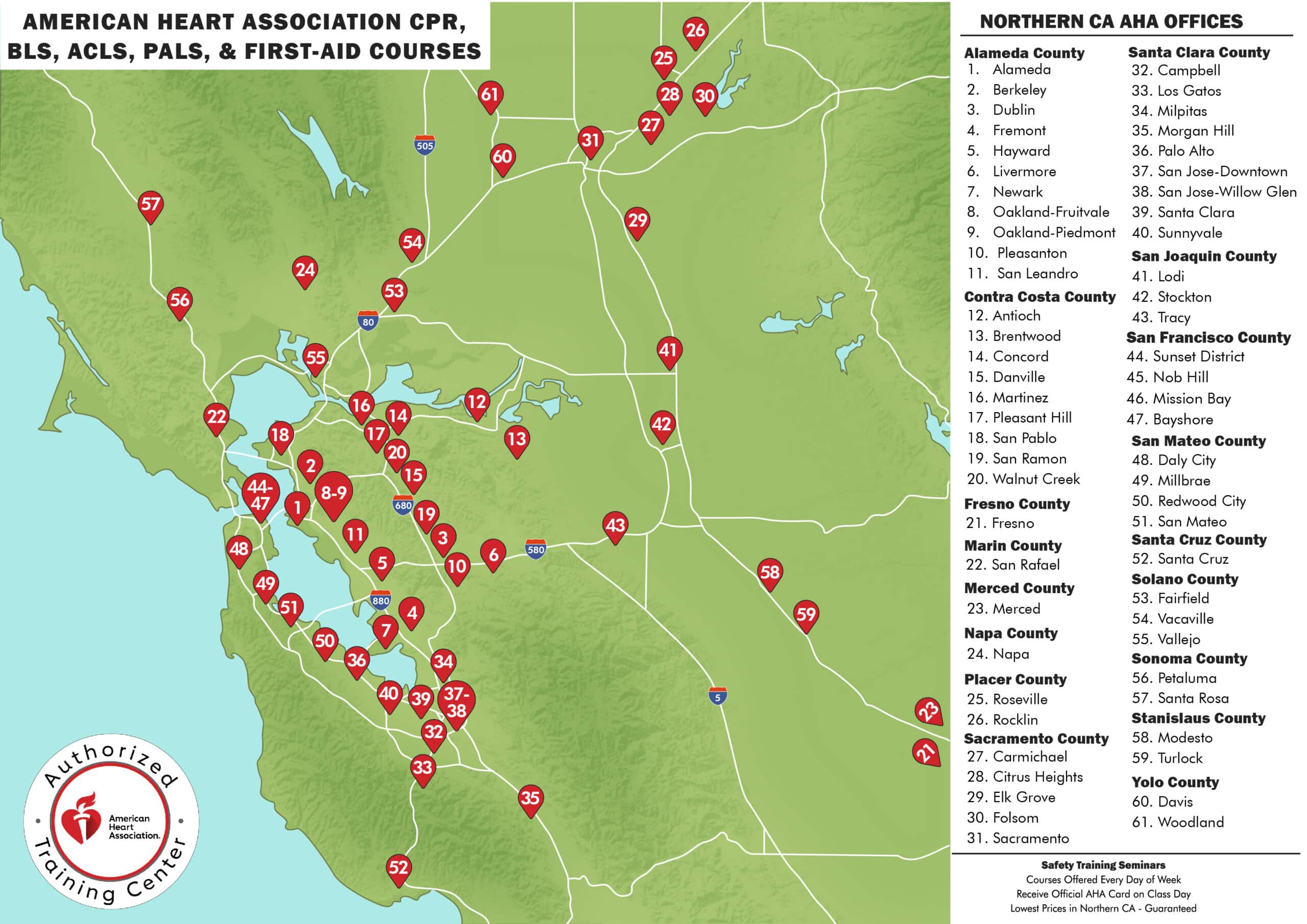American Heart Association© CPR & First-aid Classes in Fresno

CPR, AED, And First-aid
Course Name: CPR and First-aid
Online Course Length: About 2 hours online course (At your home.)
Skills Testing: 40 minutes at one of our over 60 CPR testing sites.
Description: CPR (all ages), AED, bleeding, burns, seizures, epi-pen, etc
Price: $140 (Includes the online CPR & First-aid course, skills testing, & card.)
Certification: American Heart Association CPR & First-aid
When: CPR & First-aid classes are offered every day of the week.
Card Issuance: You will receive the certification card on day of class.
Childcare Licensing: This certification card is valid for CA childcare providers.
Add ons available: Opioid Training, or Bloodborne Pathogens
Low Price Guarantee: Lowest prices in Fresno, CA. Price matching policy.
CPR & First-aid Courses Near Me In Fresno
Store locator is loading from StoreRocket Store Locator App..

CPR & First Aid Certification Classes in Fresno: A Lifeline in the Heart of California
In Fresno, California, a city known for its vibrant agricultural base and bustling metropolitan area, the significance of CPR and First Aid certification cannot be overstressed. Given the city’s mix of urban and rural areas, the potential for accidents and medical emergencies is ever-present, making CPR and First Aid skills invaluable for its residents. This article explores the critical role of CPR and First Aid certification in Fresno, detailing the availability, curriculum, and profound community impact of these vital training programs.
The Imperative for CPR & First Aid Training in Fresno
Fresno stands as the fifth-largest city in California, housing a diverse population engaged in various sectors from agriculture to manufacturing and services. The city’s demographic and occupational diversity increases the likelihood of health emergencies, including workplace injuries, vehicular accidents, and domestic incidents. CPR (Cardiopulmonary Resuscitation) and First Aid training equip individuals with the skills to provide immediate and effective responses that can save lives and prevent conditions from worsening until professional medical help arrives.
Accessibility of Training Programs
CPR and First Aid certification classes in Fresno are readily accessible, designed to meet the needs of a diverse population. Numerous organizations, including the American Red Cross, local hospitals, community centers, and private providers, offer these essential courses throughout the year. Training schedules are flexible, featuring weekend and evening classes, to accommodate working individuals and students alike.
For professionals required to hold valid certification—such as healthcare workers, emergency responders, and educators—these classes are not just a formality but a necessity. However, the courses are equally important for parents, caregivers, and the general public, who play a crucial role in the immediate response to household and community emergencies.
Comprehensive Curriculum and Hands-On Training
A typical CPR and First Aid course in Fresno covers a wide range of emergency scenarios. From cardiac arrests and choking to injuries from falls and burns, the curriculum is designed to prepare individuals for real-life emergencies. The courses emphasize practical skills, including how to perform chest compressions, use an Automated External Defibrillator (AED), and administer basic First Aid like bandaging and the treatment of burns.
Training is delivered through a combination of lectures, videos, and most crucially, hands-on practice. Instructors, often experienced professionals with backgrounds in emergency medicine, provide live demonstrations and supervise participants as they practice techniques on manikins. This practical approach ensures that trainees not only learn the procedures but also gain the confidence to perform them under pressure.
Importance of AED Training
With the increasing availability of AEDs in public places—including schools, sports arenas, and airports—the need for AED training has never been more important. CPR and First Aid classes in Fresno cover the operation of these devices, which are essential for restarting a heart that has stopped beating. Instruction includes identifying when and how to use an AED, ensuring that Fresno’s residents are prepared to step up effectively during a cardiac emergency.
Certification and Ongoing Education
Upon completing a CPR and First Aid course, participants typically receive a certification that is valid for two years. This certification is crucial for professionals whose jobs require these skills but also serves as a testament to the individual’s commitment to community safety and preparedness.
Recertification courses are equally important, as they allow individuals to refresh their skills and stay updated with the latest techniques and guidelines from authoritative bodies like the American Heart Association or the American Red Cross. In Fresno, these refresher courses ensure that the community remains capable and ready to respond to emergencies efficiently.
Community Impact and Empowerment
The broad availability and encouragement of CPR and First Aid training have a profound impact on Fresno’s community safety and resilience. Each trained individual represents a potential lifesaver, reducing the overall community vulnerability to medical emergencies. Schools, workplaces, and residential areas become safer when residents are prepared to perform these critical skills.
Moreover, CPR and First Aid certification fosters a sense of empowerment and responsibility among Fresno’s citizens. It strengthens community bonds and instills a culture of health awareness and proactive response that transcends individual benefit and contributes to the welfare of the community at large.
Conclusion
CPR and First Aid certification classes are more than just educational courses; they are crucial components of a community’s health and safety infrastructure. In Fresno, with its unique blend of urban and rural environments, the importance of such training cannot be underestimated. These classes ensure that the city’s residents are not only capable of looking after themselves and their families but are also invaluable assets in maintaining the broader community’s safety. As Fresno continues to grow and evolve, the need for widespread and accessible CPR and First Aid training remains a key priority, integral to the city’s commitment to fostering a resilient and prepared community.
FAQ
Who should attend CPR & First-Aid certification classes in Fresno?
CPR & First-Aid certification classes are suitable for anyone who wants to learn life-saving skills, including parents, teachers, caregivers, healthcare professionals, and members of the general public.
How long does a CPR & First-Aid certification course typically last?
CPR & First-Aid certification courses usually span over one to two days, depending on the training provider. The course includes a combination of classroom instruction, skills practice, and hands-on demonstrations.
Is there a renewal requirement for CPR & First-Aid certification?
Yes, CPR & First-Aid certifications are typically valid for two years, after which individuals are required to undergo renewal courses to maintain their certification. Renewal courses often include updates on guidelines and practice of skills.
